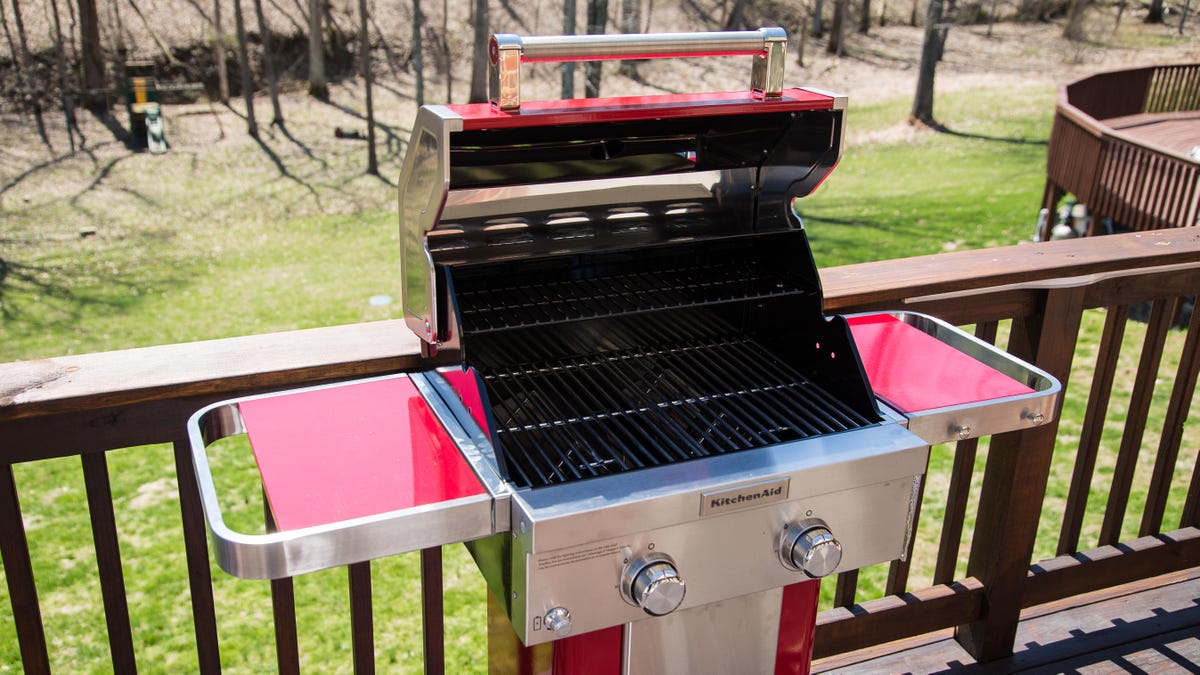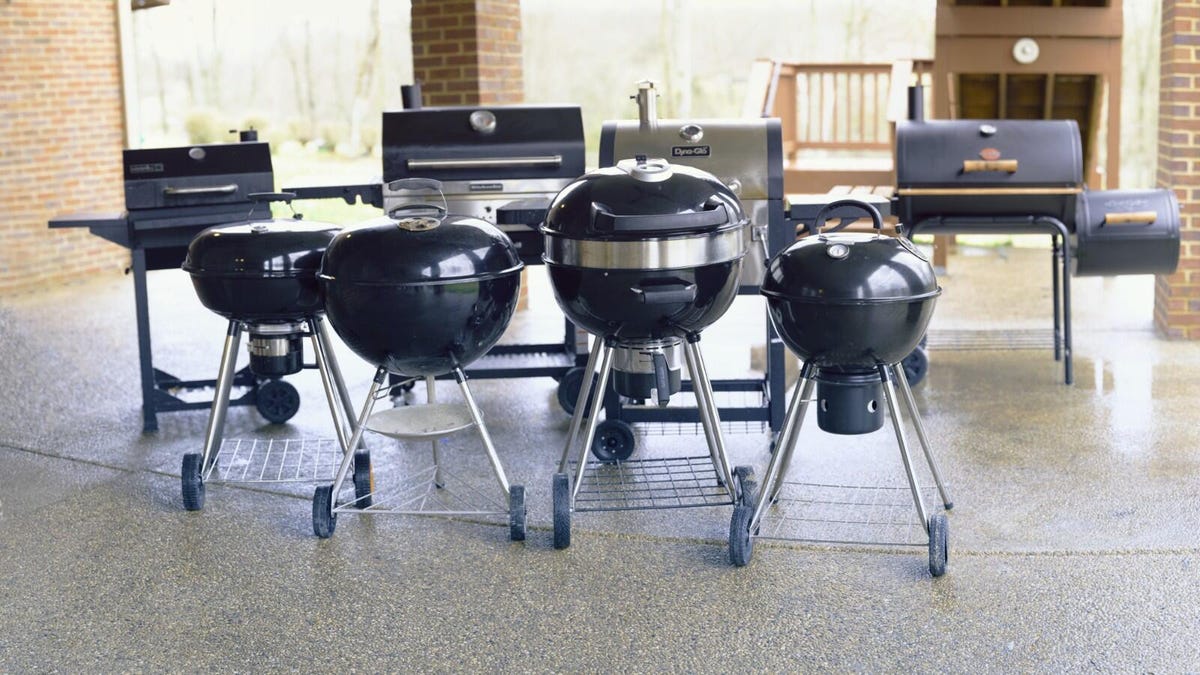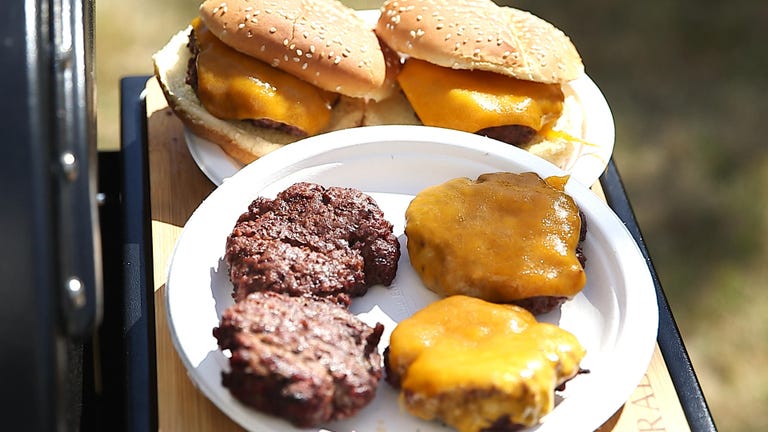While we’re starting to near the end of summertime, it’s still seriously hot outside, grilling season is very much in full swing. The warmer weather is perfect for family get-togethers, and cooking the food for your guests outside is also a great way to save on electricity since you won’t have to heat your home when cooking.
Whether you are buying a new grill because your current cooker can’t handle the needs of your next feast or it’s just time for something new, make sure you read our guide to help you find the perfect grill. Once you’ve narrowed the options down to what you need or want, check out all the great deals on many of the best grills to save yourself some money.
For more, check out CNET’s favorite charcoal grills, gas grills, portable grills, pellet smokers and kamado grills of the year.
What sort of flavors do you want for your food?
Finding the perfect grill for you boils down to a few factors, but the first one you need to answer is what your cooking style is and the level of convenience you expect from your grill. Each type has advantages and disadvantages, so knowing their key characteristics will put you well on your way to a match made in barbeque heaven.

Deciding fuel type is one of the most important steps to the grill buying process.
Gas
Gas grills are one of the most common fuel types. Built in a cart style, gas grills use either an attachable liquid propane tank or natural gas via a conversion kit connecting the grill to your home’s natural gas supply line.
The debate over natural gas or liquid propane burns hot. Natural gas burns cleaner in terms of greenhouse gases, it’s cheaper to use and you won’t have to bother with refilling propane tanks.
Read more: How We Test Grills
You won’t be able to move your grill around since it’s connected to a gas line. Liquid propane is the more popular fuel choice, and it’s portable. It’s also pricier and needs refilling. The good news is many gas grills can accommodate both, so you don’t have to choose right away.
With a gas grill, you’ll have more control over the heat and how it is distributed across your cooking surface. Gas grills such as the Char-Broil Commercial three-burner are great for adjusting between high heat for searing and lower heat for steady cooking. If you’re looking to cook meats like whole chicken or racks of ribs for hours at a time, you’ll have better results with a charcoal grill, pellet grill or smoker.

What you cook is important to determining which grill you should buy.
Charcoal
Cooking with charcoal is one of the oldest grilling methods around and is typically what comes to mind when we think of grilling. They come in many shapes and sizes, including the original Weber Kettle, which introduced the design that’s widely recognized today. As common as charcoal grills are, there are some quirks to consider when looking at these cookers.
Charcoal grills burn using charcoal briquettes or lumps of charcoal. That’s where the smoky flavor comes from. You’ll need to spend a little more time lighting the briquettes and preheating the grill than you will with a gas grill. You’ll also need to clean the grill and dispose of the charcoal ash when you’re done grilling.
Charcoal grills might not be as precise or customizable as a gas grill when it comes to cooking, but they have a distinct flavor and are the most affordable option. You can find small, portable charcoal grills for as little as $50.
There are also high-end charcoal grills, called Kamado grills, made from thick and heavy ceramic. This build material is perfect for retaining heat, and the iconic egg shape promotes airflow and maximum flavor. All of this adds up to a charcoal cooker that can handle long cooks and high-heat grilling in one.

The Traeger Timberline 850 is a pellet grill with a companion app for temperature control.
Pellets
Pellet grills, like the Traeger Ironwood XL, burn wood pellets and have an onboard computer to manage the heat up to your desired temperature. These grills can go low and slow to add smoky, wood-fired flavor to your food or get searing hot to make the perfect burger. Pellet grills yield tasty meat, especially when slow-cooked, but the pellets can be more expensive than charcoal and slightly harder to find than propane. Most hardware and big box stores are now carrying pellets.
Pellet grills use a hopper to hold food-grade wood pellets. Once you’ve ignited the grill with a switch and set the temperature, a rotating auger connected to the hopper moves the pellets into a burn pot. Pellet grills come in barrel or cart styles, and prices range from around $350 to over $2,000.

All the grills we’ve tested at the CNET Smart Home.
What size grill do I need?

Weber and KitchenAid offer grills in bright festive colors.
Once you’ve decided what fuel type is right for you, think about the size grill you need. Most small to medium charcoal, pellet and two-burner gas grills will do just fine if you’re cooking for four people or fewer on an occasional basis.
The Weber Spirit E-210 is a good example of a two-burner grill with plenty of space. Grills are often measured in square inches. Grills in the 400-500 square inch range are large enough for most people. A good option to look at for a medium-sized pellet grill is the Brisk It Origin 580.
If you’re the center of the neighborhood barbecue scene or have a large household, consider a larger model with four, five or even more burners. If you’re dead set on having a gas grill, but also want to cook meats like whole chickens or racks of ribs with indirect heat, you’ll want at least a three-burner model. If you want smokey goodness from your big cooker, then the Recteq Flagship XL is the way to go.
What extra features do I want my grill to have?
At the most basic level, a grill should just cook well. In addition to taking the right steps to prep your grill, there are a handful of extra features you can look for that will enhance your experience. For example, a side burner is a great place to heat sauces or sides without dashing between your kitchen stovetop and patio.

The Weber iGrill system has a Bluetooth thermometer and is compatible with iOS and most Android devices.
If you think you might move your grill around during the season, make sure your grill comes with wheels on all four legs and an option to lock them.
You can even up your grill with smarts. The Weber iGrill system is now on its third generation with the Weber iGrill 3. This accessory allows you to monitor the internal temperature of your food via the Weber iGrill app, probe device and iGrill-compatible Weber grill like the Weber Genesis II E-335 on our gas grill’s best list. Traeger’s app lets you remotely control the grill’s temperature, set timers and view recipes with the tap of a button on its WiFire-enabled grills.
You can even get connected Kamado grills, like the Kamado Joe Konnected Joe, to monitor its temperature and your food with the integrated temp probes. No matter which grill is right for you, getting outside with friends and family and eating food is one of the best ways to spend the weekend.

Watch this: 4 unexpected tricks for a better cookout
For more, here’s how to grill like a pro and how to clean your grill the right way. Here’s how CNET tests grills to find the best of the best.


















+ There are no comments
Add yours